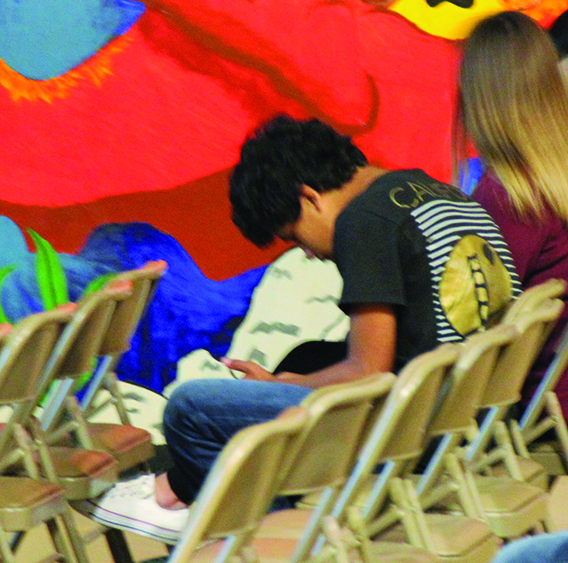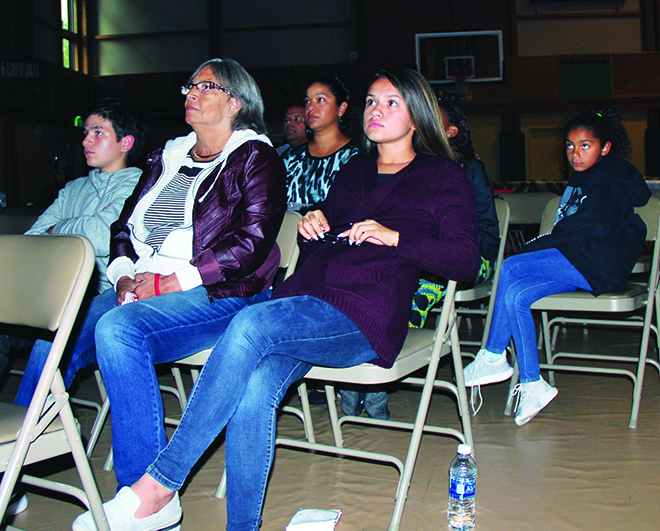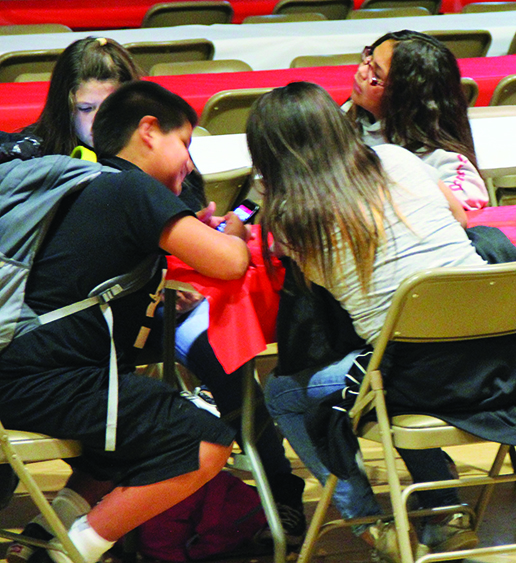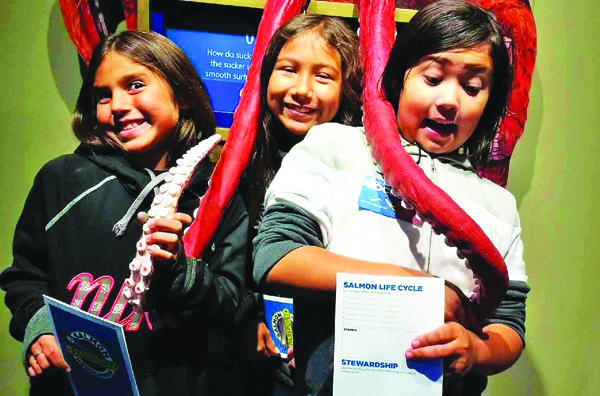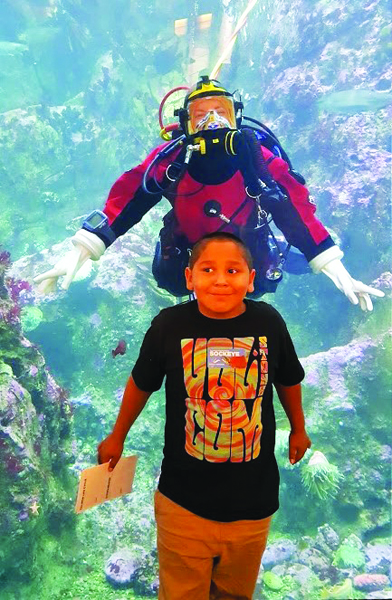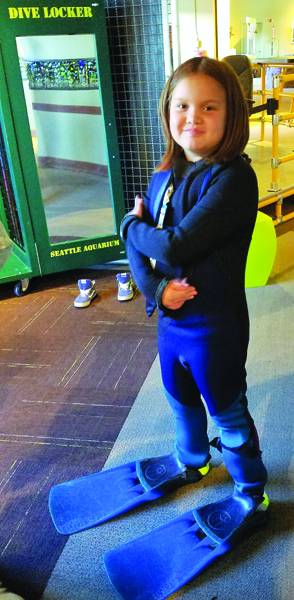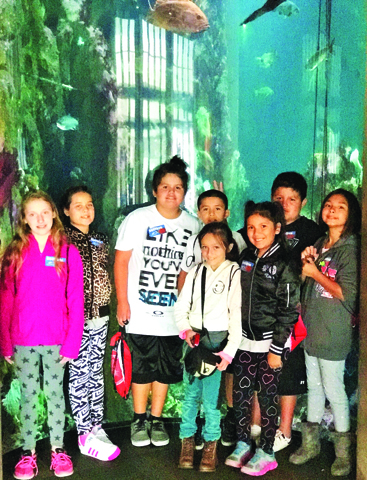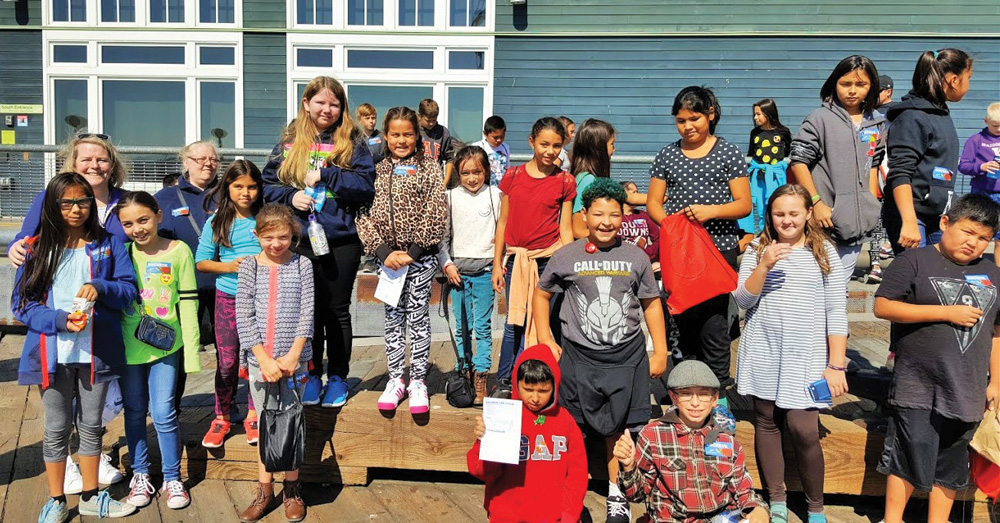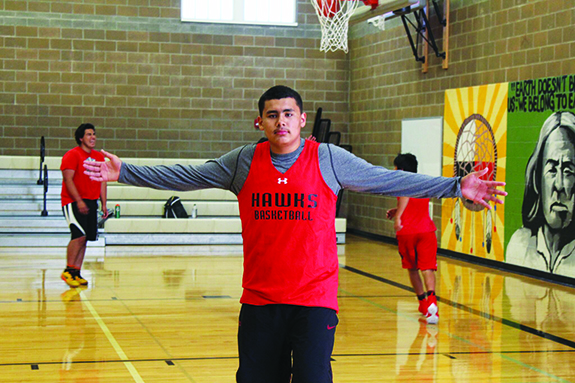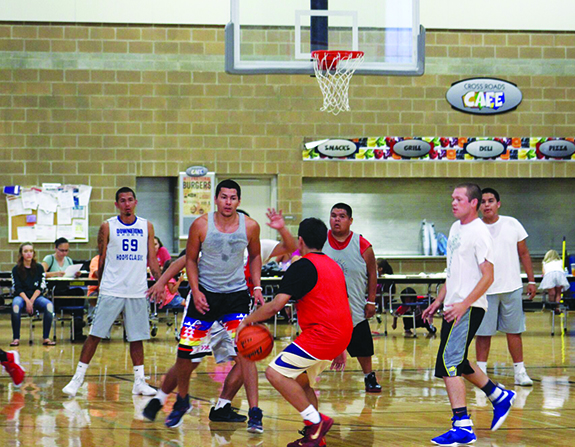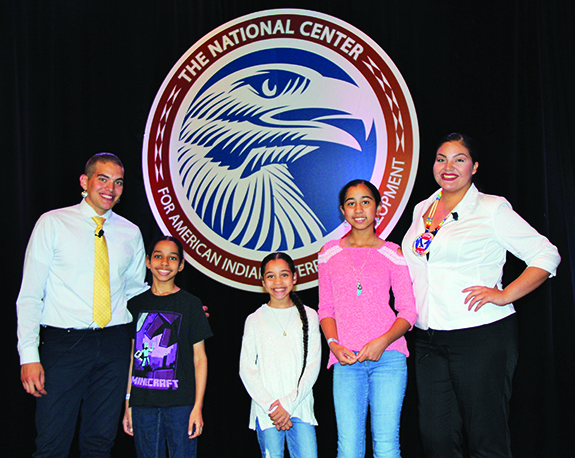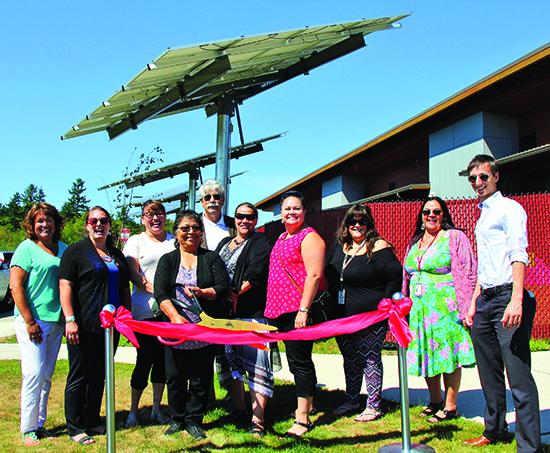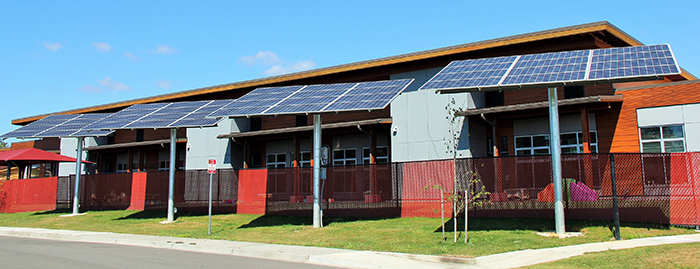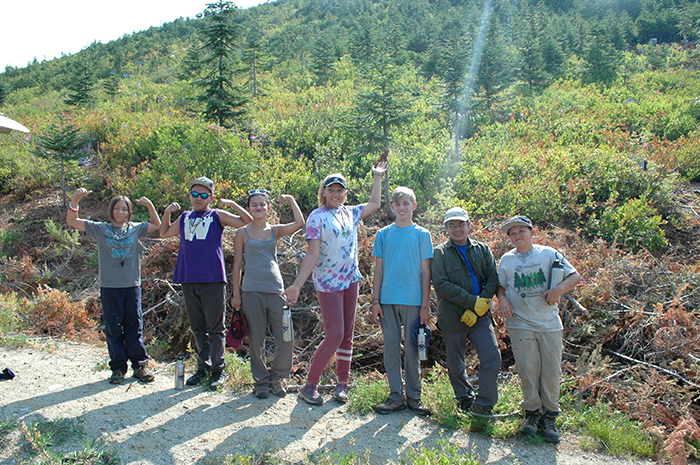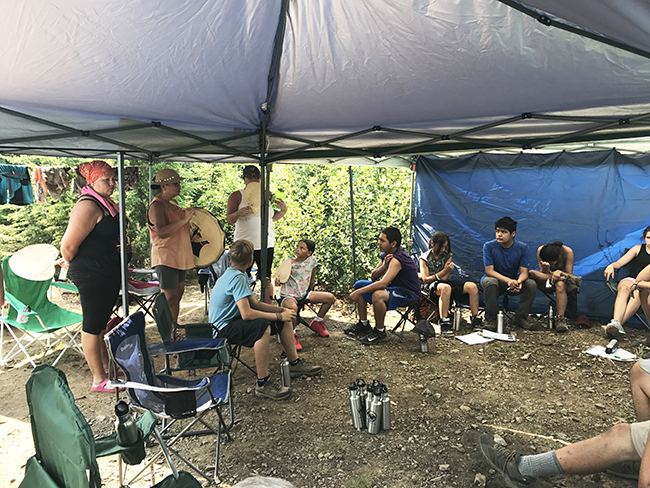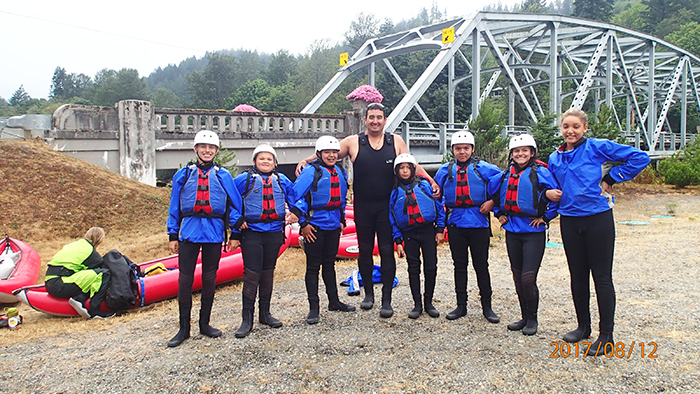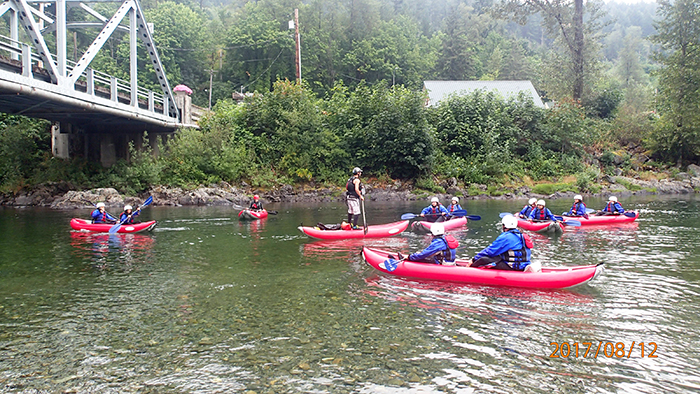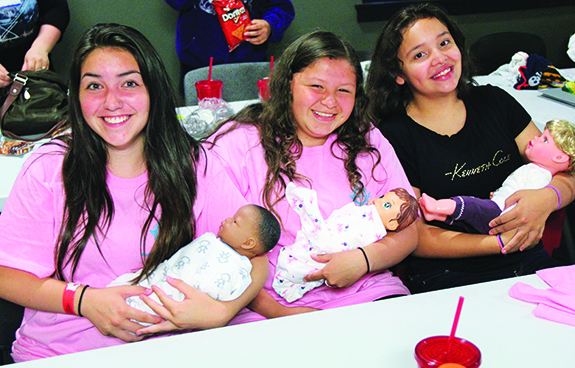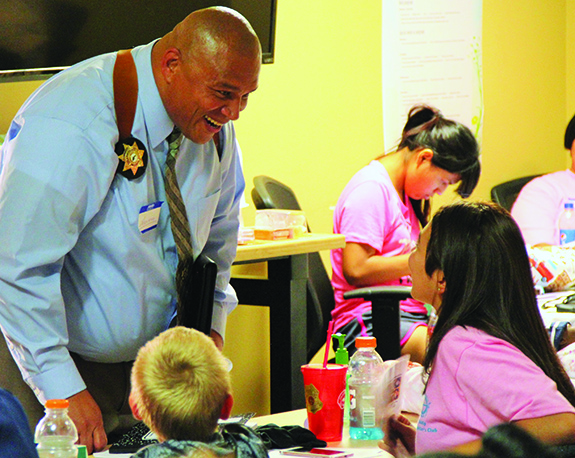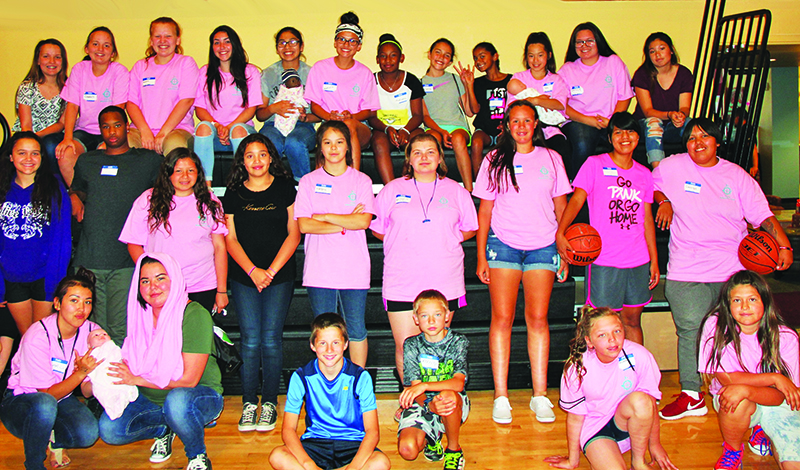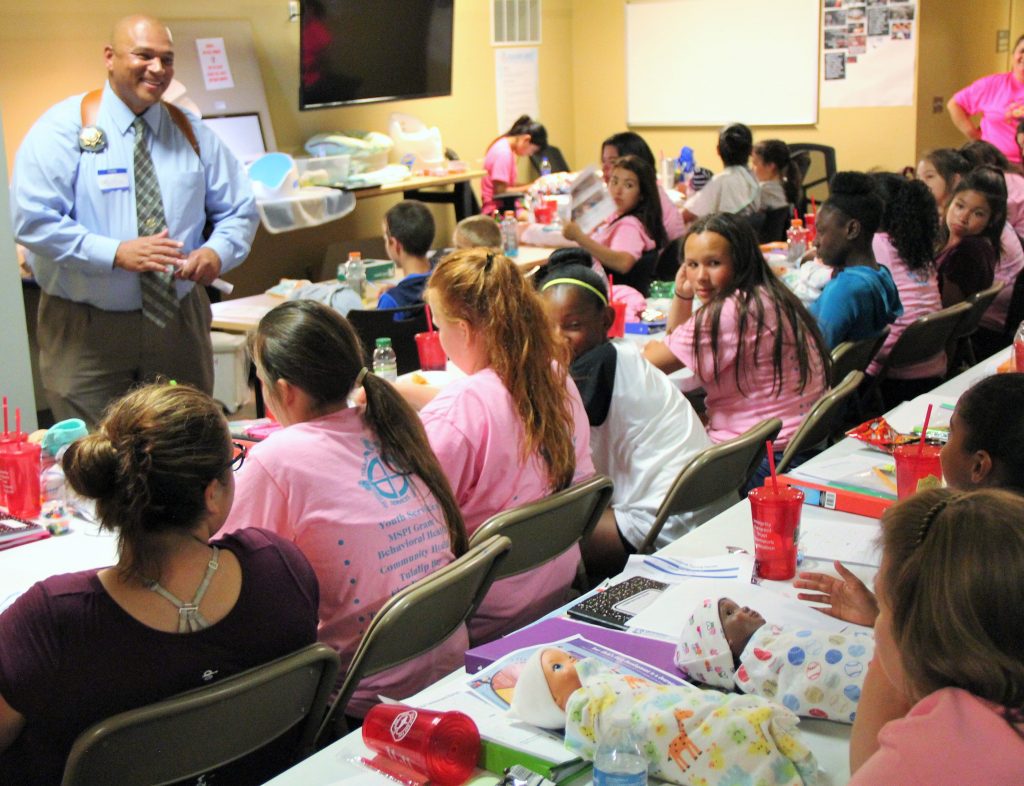Category: Education
Screenagers sheds light on the impact of youth’s increased screen time
By Micheal Rios, Tulalip News
Raising youth in our technologically advanced society is a challenge for most caregivers technologywho struggle to understand the effects and how to set limits on their children’s screen time. Today’s youth are the first to be raised in the age of the smartphone, and its influence can be felt everywhere.
Smartphones, video games, and digital media have created new headaches for many families. Concepts like sexting, online bullying, video game addiction, and obsessive social media attachment have become common practice among today’s youth. Behaviors as these can often lead to disruptions in school and sleep, anti-social behavior, and depression. For parents and caregivers, the question of how to even begin addressing these concepts with their children seems like a daunting task.
In this context, Tulalip Youth Services invited youth and their parents to participate in a discussion of the topic and view the award-winning film, Screenagers: Growing Up in The Digital Age, on the evening of September 19. Screenagers is the first feature documentary to explore the impact of screen technology on kids and to offer parents proven solutions that work.
“Parents should always take the time to talk to their kids about the risks of technology, especially social media and using technology appropriately,” stated Teri Nelson, Youth Services Executive Director. “There are some great uses in the digital age that provide opportunities to learn and be creative, but with everything there needs to be moderation. I feel big concerns for our youth are online safety, privacy and reputation management with social media. One bad decision to post something inappropriate can have long-lasting, damaging effects.”
During the film’s screening there were 32 youth in attendance, plus several caregivers and Youth Services staff members.
Screenagers provided an in-depth, personal look at how families are coping with kids and screen time, the plot explored how being connected to devices is affecting relationships and even child development. Directed by Dalaney Ruston, a Seattle filmmaker and physician, the movie profiles her own family’s struggles with smart phones, social media, and video games. The film includes interviews with parents, teenagers, authors, psychologists and neuroscientists providing ideas on how we can empower ourselves to best navigate this digital world we live in.
Throughout the film, children and their parents are shown dealing with often serious consequences related to excessive screen time, or screen time without boundaries. Revealing stories that depict messy struggles over social media, video games, academics and internet addiction are shared.
A boy who lives with his grandmother becomes a “different child” when told he has to get off his video games. The grandmother seeks help for dealing with the confrontations.
Another boy, Andrew, is so consumed with playing video games into the wee hours during his freshman year of college that he stops going to classes and leaves school. He enters a rehabilitation facility to treat his addiction.
A girl with a love of photography spends most of her time in her room posing and taking pictures of herself to nurture a social identity aimed at getting “likes.”
Another girl, Hannah, shares a picture of herself in her bra with a boy she likes. When he shares the picture, the girl deals with the fallout at school and being bullied.
It’s not just the kids scrolling Facebook or Instagram or blasting away on the PlayStation that demand the attention of the filmmakers. Adults connected to work and their own social outlets through devices are called out by the very kids who they are attempting to digitally police.
“Can we really tell our kids, ‘Do as we say and not as we do’?” the film asks.
Interwoven into these stories, are cutting edge science and insights from thought leaders who present evidence on the real changes happening in the brain. For example, we are led to believe that through technology we can multitask. However, the truth is our brains aren’t built to multitask. We’re meant to focus on one thing at a time. Switching what’s on our screen from Facebook to Instagram to Twitter and inevitably back to Facebook , that back-and-forth raises levels of the hormone cortisol in our brains. Cortisol is the hormone produced when we are stressed. On top of that, every time you refresh any of your social media feeds, the brief burst of news or images gives you a quick dopamine hit, which activates the brain’s pleasure centers and leaves you wanting more. It’s a destructive cycle that can lead to addiction and an inability to stay unplugged and offline.
While our digital lifestyle is certainly not going anywhere, it’s critical to find a healthy balance between screen time and real-world interactions. In most cases, this means putting realistic restrictions on screen time for children and their parents.
Among community viewers at the film screening was tribal member Nickie Richwine and her three daughters. Following the movie, Nickie shared she already places restrictions on when and how her daughters can use their devices, but has learned additional methods of staying offline from the film.
“My girls are 15, 11 and 8-years-old. I took them all to see Screenagers because as a parent I believe that technology and electronic overuse prevents them from developing social skills that they’ll need as they become young adults,” says Nickie. “Face-to-face interaction is necessary to build healthy relationships with their peers. Texting and IM’ing is no substitute. My kids struggle to understand why I limit their screen time, but one of the main reasons I do is to protect them. Kids don’t understand the internet has a lot of dangers and potentially harmful exposures. I was hopeful that this film would help them understand that.”
Dexter Smith, 8th grader and junior rep for Tulalip Youth Council, was also present for the film and recognized some of his own behavior when it comes to video games. Dexter said he can get too caught up in video games and become angry, especially when he loses. He says he is going to work on that and adds, “I think people my age are on their phones too much when they could be enjoying the outdoors. My advice to youth out here is to stay off of inappropriate sites and not make posts hurtful to others.”
Two young ladies, who wished to remain anonymous, shared, “It’s become way easier to text someone than it is to have a conversation in person. We’re so attached to our phones that we don’t even realize we’re addicted to them. People are controlled by their phones and social media accounts, kids and adults. Even in school kids are constantly posting and updating through their phones during class. It’s a distraction from their education.”
Screenagers: Growing Up in the Digital Age probes into the vulnerable corners of family life, and delves into the messy family conflicts over social media, video games, academics and internet addiction. Only through self-reflection and an open dialogue do solutions emerge on how we can best empower young people to navigate the digital world. More information can be found at screenagersmovie.com.
The doctor’s prescription for limiting screen time
- Dr. Ruston suggests putting phones and other devices away at meal times, in the car and during family outings.
- While studying, teenagers should put their phones in another room but can take “tech breaks”.
- No phones, tablets or other devices in the bedroom when it’s time to sleep.
- Rather than relying on your phone, buy an alarm clock and a calculator.
- Limit interactive video games to certain times – the weekend, for example – especially for younger children.
- Try what a group of teenagers do in the film: when they eat out, they put their phones in the middle of the table. First to check their phone pays for dinner.
- Set aside regular time to calmly discuss any issues about mobile phones and other devices rather than letting them spark arguments.
- Parents worried about their children’s screen usage should think about what they are doing themselves.
5th graders make a splash at Seattle Aquarium
By Micheal Rios, Tulalip News. Photos courtesy of Malory Simpson
Four 5th grade classes at Quil Ceda Tulalip Elementary (QCT) were provided with the exciting opportunity to experience all that the Seattle Aquarium has to offer on Friday, September 19.
Interesting fact, the Seattle Aquarium is the ninth largest aquarium in the United States by attendance and among the top five paid visitor attractions in the Puget Sound region. Bolstering those stats are an additional 96 QCT students, accompanied by teachers and chaperones, who made the field trip to the region’s premier resource for hands-on marine experiences.
“My favorite thing about the student’s field trip was seeing how eager they all were to learn,” said Breezy Distefano, Native Liaison.
“There were so many stations and exhibits throughout the Aquarium setup for the students to interact with,” added Malory Simpson, School Advocate. “They learned a variety of things from details of marine ecosystems to the life cycle of a salmon.”
Being salmon are often viewed as the staple food source of Coast Salish people and the Tulalip Tribes moniker is ‘People of the Salmon’, it is only fitting that the cohort of 5th graders got to learn much about salmon on their trip.
The QCT field trip coincided with the 25th Anniversary of the Salmon Homecoming Celebration held at Waterfront Park, Seattle. Along with the visit to the Aquarium, the students were able to participate in Think Salmon School Days activities.
“My favorite memory of the trip is when we first arrived and the students got to sit and listen to other Native youth drumming and singing as part of the Salmon Homecoming festivities,” marveled Malory. “It is always a beautiful thing to see our students witness other Native students practicing their traditional teachings. It helps to reinforce the ideas and values that our students are being taught at Quil Ceda Tulalip.”
Tulalip Heritage High School Receives Accreditation
By Kalvin Valdillez, Tulalip News
Tulalip Heritage High School recently received accreditation through AdvancED, an accrediting agency comprised of educators who conduct on-site external reviews of Pre K-12 schools. The education accreditation procedure is a yearlong voluntary process in which a school becomes a certified institution by meeting a set of external standards of quality. Due to successfully completing the process, Tulalip Heritage has been granted accreditation for the next five years.
Tulalip Heritage was previously accredited under Marysville-Pilchuck, the recent accreditation now recognizes Heritage as its own school and by doing so, the high school has the opportunity to thrive on its own, as well as provide a fresh outlook for potential students and their families. On the evening of Wednesday August 30, Tulalip Heritage celebrated their accreditation with the Tulalip community at the Francis J. Sheldon Gym.
“It’s really a huge accomplishment for us, as a school, to receive this accreditation,” states Tulalip Heritage High School Principal, Shelly Lacy. “We’re accredited through AdvancED, they have accredited over 34,000 schools nationally and we actually scored ten points higher than their average. A lot of times we hear in the community that Tulalip Heritage is an alternative school, that we’re less than. This accreditation tells them no, we meet the same standards; as a matter of fact, we exceed those standards.
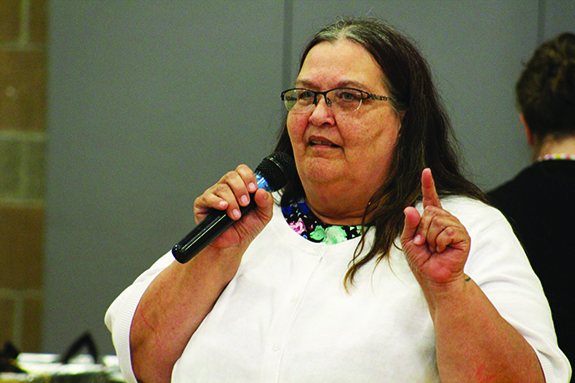
“It took us a year to get ready,” she continues. “[AdvancED] were at our school for three days and spent over a week looking at all of our data. They came in and did interviews with the students, parents and staff; and also observed the classrooms. We learned a lot through the process, [the accreditation] is good for five years and is an ongoing process where we continue to work with them to improve our instruction so that we make sure that our students receive the best education that they can receive.”
The accreditation celebration allowed parents and students a chance to fill out paperwork for the upcoming school year. Heritage also provided dinner, a spaghetti-bar buffet by Olive Garden, as well as entertainment as many Tulalip Heritage Alumni took to the basketball court to compete in a full four-quarter game against the current Heritage High School student-athletes.
“When we thought about celebrating the accreditation, we wanted to include all of our alumni because they are who made our school important. They came and did their best work here and then they continue to come back. They come back to support the athletes, they come back to volunteer at our school. So, we wanted to make sure we included them and the best way is through their love to play sports.
“The one thing we’re most excited about is this year’s graduating class will receive the first-ever Tulalip Heritage High School diploma, we’re really excited about that,” Shelly expresses. “We’re in the process of designing the new diplomas. They will say Tulalip Heritage High School and will include our logo and probably a picture of our school. We thank the Tribe for their support because we couldn’t offer our students what we offer without the Tribe’s support. We can offer P.E., have a full-time counselor and a full-time principal because the Tribe supports us, so that we can make sure our kids have everything they need to graduate and be successful in college and their future careers.”
YES! Youth Entrepreneurship Summit
By Micheal Rios, Tulalip News
Engaging and inspiring Native American youth toward success, a one-of-a-kind Youth Entrepreneurship Summit (YES!) was held in the Tulalip Resort Casino’s Orca Ballroom during the afternoon of Tuesday, September 5.
Designed for Native high school and college-aged students interested in business and entrepreneurship to hone their skills and learn more about what it takes to become successful in business, YES! offered Tulalip youth especially an opportunity to hear good words and success stories from Native business owners around the area.
To get the eager young minds’ creativity flowing, the summit opened up with a thought exercise. Everyone closed their eyes and pictured themselves in a tunnel, and at the end of the tunnel there is a ball of light.
“That ball of light represents your success, your dreams, your ambition, and everything you are striving for in life. That’s what is at the end of your tunnel,” declared event co-M.C. Dyami Thomas (Klamath/Leech Lake Ojibway). “Now envision on both sides of your tunnel are open doors. These open doors represent your struggles, obstacles, and all the negativity in your life. These doors stay open and there are thousands of them, but as you zoom towards the ball of light and move passed each door it closes. You can look right and look left into the open doors, but never walk through them because once you walk through one you never know if can get back on your path to the ball of light.
“This tunnel, your tunnel, represents tunnel vision to the person your meant to become. Always see that light at the end of the tunnel. When you feel lost, sad or lonely then close your eyes and see yourself in that tunnel and look towards your ball of light. Some of us like to quit and give up because they aren’t making big steps, so they start making excuses and entering those open doors only to never make it back on their path. You all have to understand that no matter if it’s a big step or many small steps, each step is heading in the same direction, and it’s toward that ball of light; to your success and ambition making your dreams come true.”
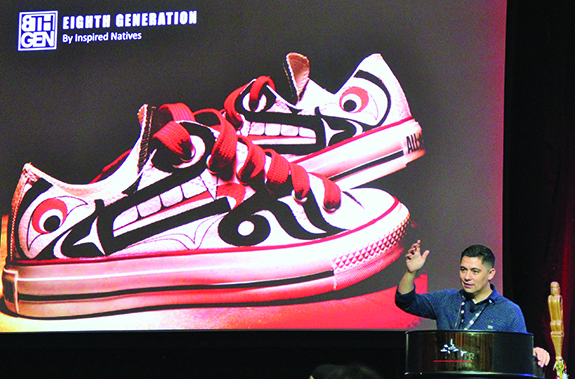
Following the exercise, audience members were amped to hear several successful Native entrepreneurs share their stories. Guest speakers included Louie Gong (Nooksack – artist and owner of Eighth Generation), Rebecca Kirk (Klamath – singer, actress, and talent manager), Jordan Skye Paul (CRIT Mohave – user experience manager at Pinterest), and Dyami Thomas (model, actor and motivational speaker).
Among the crowd of engaged youth was a family of Tulalip tribal members, mother Angela Davis and her three children Abigail, Samuel, and Samara Davis. Angela said she was excited to bring her kids to the Youth Summit after seeing a flyer online, “Entrepreneurship is something we’ve been talking about with our children for years now. We encourage them to be their own individual, to be unique, and embrace their Native American culture. Attending this event is another way for us to encourage and implement what we’ve been teaching them.”
11-year-old Samuel commented his takeaway from the Youth Summit was that you can start from scratch and make something really big out of your passions. Younger sister, 9-year-old Abigail added, “I learned you can build amazing things if you really put your mind to it. If you try really hard and focus on what you want to make out of yourself, then you can make it happen.”
With encouraging and inspiring feedback from future Tulalip entrepreneurs, YES! was effective at engaging the youth who attended and helping to plant seeds for future success.
Washington State University – Everett
Submitted by Jeanne Steffener, Higher ED
Washington State University (WSU) – Everett opened it’s doors on August 18, 2017 with a ribbon cutting ceremony. Hundreds of new students, potential students and those just interested in seeing Everett’s newest educational instutution stopped by for a tour.
The new building, a four-story structure (95,000 square feet of space), is located at 915 N. Broadway. The Fall term began August 21, 2017. The structure has taken over two years to construct and cost $64.6 million dollars to design and build. The building is projected to house around 1000 students. The building will have classes and programs of WSU-Puget Sound–Everett and EvCC’s University Center offering bachelor’s and master’s degree programs. Everett is WSU’s fifth campus along with Pullman, Spokane, Tri-Cities and Vancouver.
The project has taken years to materialize; stemming from legislation coming out of Olympia beginning in 2005, which paved the way for WSU’s decision to locate in Everett and including a financing mechanism for the structure.
Students will typically enter WSU-Everett with two years of education – Associate of Arts Degree from a community college. WSU calls this a “two plus two” model. The school will offer six degrees: mechanical engineering, electrical engineering, software engineering, data, hospitality business management and integrated strategic communication. In the future, the school is planning to have a program dealing with organic agriculture systems.
This new building establishes a strong, physical identity for WSU in the Puget Sound area and will stimulate more interest for prospective students. The potential increase of an academic population coming into the area could be a catalyst for new economic development in the North Everett area as well as encouraging a much needed revitalization to this part of town. In the future, we can imagine new types of shops, coffee houses, restaurants and other types of business catering to university students, professors and the myriad types of employment associated with a university town.
In the WSU degree programs at Everett, students will have:
- Convenience of a campus close to home with affordable tuition
- Expertise and resources of one of the nation’s top public research universities
- Businesses throughout the North Puget Sound area employing WSU graduates and actively looking for more
- Low student to instructional faculty ratio: 15 to 1
- Diverse community of men and women with a large share being multicultural
Cougar Advantage: Students are mentored by faculty, motivated by high-achieving peers, and supported by Cougs around the world. Once you are a Coug, you will have a network of supporters who will help you land your first job and open career doors.
If you are interested in opening a door to a promising future, pick up your phone and call 360-716-4888 to contact the Higher Education Department for more information or email us at highered@tulaliptribes-nsn.gov.
Early Learning Academy goes solar
By Micheal Rios, Tulalip News
A sunshine celebration ribbon cutting was held by Tulalip tribal leadership on Tuesday, August 15, to honor the many benefits of the Betty J. Taylor Early Learning Academy’s solar energy movement. In partnership with Bonneville Environmental Foundation’s Solar 4R Schools program, four 20’x14’ solar panels were installed at the learning center back in April. Since their installation they have been harnessing the power of sunlight and turning it into electricity to help power the 52,000 square-foot Early Learning Academy,
“We are so excited to be the first tribal facility to go greener,” says Sheryl Fryberg, Director of the Early Learning Academy. “We want our children to learn at a young age the importance of how to make our planet a cleaner, safer place for future generations.”
Overlooking scenic Tulalip Bay, the sunlight absorbing solar panels have a direct sightline to the most powerful source of energy in the solar system, our sun. Making further use of the life-giving and renewable energy source, the solar movement forwards the Tribe’s goals of creating a healthy, sustainable community. There is no loss of air or water quality as a result of increasing the amount of energy now available to the Early Learning Academy. In this respect, making use of renewable energy is highly compatible with Native beliefs, such as living in harmony with nature and protecting the environment.
“This solar panel project is about showing our community what’s possible with solar energy. I’m committed to renewable energy all the way and even have solar panels installed on my home,” states Bonnie Juneau, Tulalip Board of Director. “Solar energy is proven to be effective and reduces our harm to the environment. It’s phenomenal. Going forward, all of our buildings will have south-facing roofs so the panels can harness as much sunlight as possible.
“This project also gives us an opportunity to show our children what exciting things can be achieved with math and science. Teaching them about solar energy at such a young age will only help them in the future. Think about the possibilities, about what one of our children may be able to come up with in 15-20 years. I’m so excited just thinking about what is now possible.”
Indeed, the Early Learning Academy’s children have already begun learning about solar energy in fun and effective ways. Solar 4R Schools program delivers one of the most comprehensive renewable energy STEM education experiences in the nation. Through teacher training, science kits, teacher-generated activities and real-time access to energy generation data from 200+ solar systems nationwide, we are directly empowering the next generation of clean energy leaders.
“The preschool staff are thrilled to be learning new activities to teach our children,” explains Sheryl Fryberg. “They were part of an all-day training to learn how to teach their preschool children energy projects in the classroom. They learned how to build a solar energy car, bake with a solar oven and even make some Crayola shirts with a solar oven. Our children will be learning how to do these projects and we are hoping that it will spark a long term interest in them about how to do their part to save the planet.”
An underlying benefit to the Academy going solar is a reduction in utility costs, which will allow more dollars to be directed toward educational needs. The solar panel array has produced 8,767.4 kWh (kilowatt-hours of electricity) so far. Given that the school has the SNOPud general utility rate of $0.0891/kWh, the solar system has generated approximately $781.18 worth of electricity savings to date.
Located in the lobby of the Early Learning Academy is a very cool information kiosk that gives students, teachers, and visitors an in-depth look into solar electric energy generated by the panels. At any given time one can see live data in a variety of ways. Equivalency results detail the impact of conservation efforts made by using the solar panels. To date, 13,584 pounds of CO2 has been saved which is the equivalent of 14,767 miles driven by an average passenger vehicle, 6,575 pounds of coal burned, or 14.3 barrels of oil consumed.*
For more information on the Academy’s solar panel project please visit http://www.solar4rschools.org/kiosk-betty-j-taylor-early-learning-academy for live data and further renewable benefits.
*Source: https://www.epa.gov/energy/greenhouse-gas-equivalencies-calculator
Quil Ceda Tulalip Elementary Back to School BBQ, Aug 22
Tulalip Mountain Camp 2017
By Libby Nelson, Senior Environmental Policy Analyst, Treaty Rights Office, Tulalip Tribes Natural Resources Depoartment
Mountain Camp 2017 kicked off with Kelly Moses storytelling and preparing the kids for their mountain journey, in the longhouse around a fire.
The kids backpacked the first three days into Barlclay Lake where they explored, hiked and stayed cool swimming
With guides Ross Fenton and Matthew Moses, the group then went to swədaʔx̌ali, our co-stewardship area in the Mt Baker-Snoqualmie National Forest, where they participated in our huckleberry restoration work. The kids joined Chelsea Craig, Patti Gobin and Melissa Gobin in cedar weaving and making cedar headbands. Natural Resources Department staff members Ryan Miller, Daryl Williams, Ross Fenton, Matthew Moses, and Zach Lamebull talked with the youth about careers in natural resources.
It was hot at 5,000 feet, but nights were just right and skies were starry. Michelle Myles from the Lushootseed Department and I spent Thursday night at camp, with Michelle telling stories under the stars before bed. As before, kids learned to set up tents, carry their own gear, cook in the wilderness, conserve water, and support each other, and about their mountain culture. Once again, Inez Bill helped contribute to the program with her ideas and feedback on our curriculum.
For the first time this year, we ended camp with a river trip. Kids got a lesson in kayaking and suited up for a three-hour downriver trip starting at the bridge in Skykomish. We contracted with Outdoor Adventure Company of Index, and the kids seemed to love it!
Learning the business of babysitting
By Micheal Rios, Tulalip News
A free, daylong babysitting training class took place at the Tulalip Youth Center on Monday, August 1. Boys and girls age 11 and older learned how to perform basic child-care skills like diapering and feeding, first-aid essentials, development stages of children, helpful strategies for play activates, and the subtleties of child discipline.
An astounding thirty-eight youth showed up and participated in the daylong class. In coordination with Behavioral Health and Youth Services, the event aimed at making preteens and teenagers well-rounded caretakers was effective and made an immediate impact for several soon-to-be professional babysitters.
“We were inspired to share a class on babysitting because we wanted to focus primarily on teaching and encouraging our youth to expand their knowledge base, while teaching entrepreneurial skills to those who wished to start up a small business in the community,” states Monica Holmes, Youth Services Parapro. “Babysitting is something many kids do on a regular basis with family and close friends as they become teenagers. We wanted to arm them with the skill sets to be safe and marketable in order take their babysitting to the next step.”
Expanding the youths’ babysitting skill sets was achieved by taking advantage of those who could impart their professional knowledge on the subject, community resources who were willing to connect with the kids to make the biggest impact. Such resources included representatives from Tulalip Bay Fire and Rescue, Police Department, and Tulalip Community Health.
“I talked to the kids about safety in the home, as far as being a babysitter keeping themselves and the children they are supervising safe. We discussed the best practices for keeping kids safe in the home, protocol for answering the phone and what information should and shouldn’t be given out,” says Patrol Commander Sherman Pruitt, a 13-year veteran of the Tulalip Police Department. “We also went over how to stay prepared in the event of an emergency situation while keeping the safeguarding of their children the priority.”
Tulalip Bay Fire and Rescue taught basic first aid, choking hazards and in-home and personal fire safety. They also brought their ambulance and allowed participants to get in and ask questions. Tulalip Police Department spoke to youth about personal and home safety, like answering the door and telephone while babysitting, and what to do in the event of an emergency. Tulalip Community Health helped coordinate all the curriculum and hands-on teaching materials. Suzanne Carson LPN, was the co-presenter for the day and led various break-out sessions.
“We could have taught the class with just one or two instructors, but it seemed more enrichening to include these community partners. We wanted kids to learn from the best but also find people they could look up to or inspire to be like,” continues Monica. “Our community resources became mentors and positive examples in a large sense. It also helped to break down the barriers that sometimes exist between youth and organizations like the Police or Fire Departments.”
After each babysitter selected a baby doll of their choosing, complete with assigning it a gender and name, they were put into small groups. Through the course of the day, the thirty-eight aspiring babysitters rotated between different training stations set-up to replicate various real-life babysitting scenarios.
Instruction stations including the Potty Time Station, which featured all the supplies they’d need to properly diaper, change clothes and swaddle their infant or toddler. There was a First-Aid Kit Station that included supplies for basic first-aid in the event an emergency were to occur while babysitting. There was also a Babysitter’s Magic Bag Making Station, which included supplies, games, toys and arts-n-crafts items the youth could pack into a backpack and bring along with them to any babysitting job to keep their kids occupied and happy.
“Later in the day we designed hands-on Live Babysitting Stations where we invited community members to bring in their children ages 6-months to 10-years to be babysat by our newly minted babysitters,” explains Monica. “This is innovative to most mainstream babysitting classes in that most youth are never given a ‘trial run’ of babysitting in which staff and volunteers could observe, correct and praise their actual skills. We were so impressed with not only the maturity of the youth who attended, but also the drive and desire to take the skills they’d learned and create a real business out of them.”
At the end of the day all participating youth received a certificate of achievement and several take-home supplies to begin their very own babysitting business. Several of the youth have already developed some online advertisements for their new business. One such shining example is 11-year-old tribal member Mariana Richwine.
“I’ve been babysitting my younger sister since I can remember. Taking the babysitting class was fun and I learned a lot of tips and new information,” admits Mariana. “I learned what to do if a baby is choking and how to put a baby to sleep without being smothered by blankets. I’m more confident to babysit babies now that I know how to handle these situations.”
Since learning the added skills and importance of marketing herself as a certified, professional babysitter Mariana has created her own Facebook page titled Sissy’s babysitting service. She was joined in the babysitting class by her younger sister, 8-year-old Malana and older sister, 14-year-old Martelle. Their mother Nickie Richwine shared her impressions of the class she entrusted her three daughters to for the day.
“As soon as I learned about this training I knew my girls would be attending. They have always watched their little sister for me, and in the last two years my oldest ones started babysitting for friends and family. I knew there would be more they could learn in addition to their own experiences, and they did. I was happy to hear that our Tribal police and fire departments were also involved and taught the kids what to do in emergency situations. I feel like my girls are now well experienced and trained to babysit at any time.”

